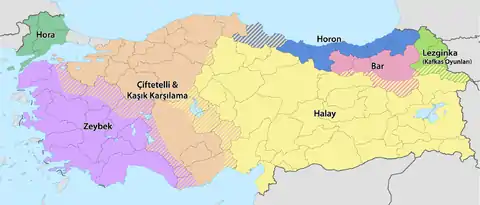Karsilamas
Karsilamas (From Turkish: karşılama, in Greek: καρσιλαμάς) is a folk dance spread all over Northwest Turkey and carried to Greece by Greek refugees. The term "karşılama" means "encounter, welcoming, greeting". The dance is popular on Northwestern areas of Turkey, especially on wedding parties and festivals.

In Greece and Cyprus there is a similar dance named, Antikrystos. Antikrystos, translates also, as "anti-face", i.e., face-to-face.
Karsilamas is a couple dance that is still danced in what was the Ottoman Empire, from Persia to Serbia, and in the Macedonia and Thrace regions of Northern Greece.
Figures of the dance may, vary from region to region but main theme is two people face each other, and music rhythmically controls their next moves. Traditionally people dance without any figure on their minds, just figures they have seen from their elders.
The meter is 9
8, and the basic move is danced in four small steps with durations 2+2+2+3, respectively. The style and mood (bouncy, smooth, lively, etc.) vary depending on the region.
Cyprus Antikrystos - Καρσιλαμαδες, Rumeli Balkan karsilamas, Thrace (Greece) Antikrystos, Merzifon Karsılaması, Edirne Karsılaması, Komotini (Greece) Karsilamas - Aptalikos, Giresun Karsılaması, Taraklı Karsılaması, Bilecik Karsılaması, Old Karsilamas (Παληός Καρσιλαμάς), Pigi Karsilama (Πιγκί), Ayşe Karsilama (İskender boğazı) (Αϊσέ) (Η Αγάπη Είναι Καρφίτσα), (Aptalikos Karsilamas (Απτάλικος), Asia Minor Karsilamas (Melinos karsilamas), Mastika.
Kanto
Kanto was heavily influenced by musical theatre, Balkan and Byzantine or Anatolian music (Karsilamas) (which was however often a subject of satire in kanto songs).
Köçekçe
The kyuchek (köçekçe), as a common musical form in the Balkans (primarily Bulgaria and Northern Macedonia), is typically a dance with a 9
8 time signature; two variant forms have the beats divided 2+2+2+3 and 2+2+3+2. (This latter meter is sometimes referred to as "gypsy 9".)
References
External links